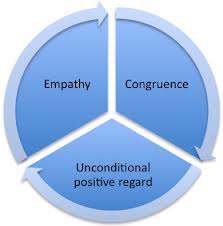Sharon O'Farrell
Jeffrey A. Kottler in his book On Being a Therapist in a chapter called The Therapists Journey concludes:
 “There is no other profession that can be as fulfilling and satisfying, no other job that provides as many opportunities for continual learning and growth. Being a therapist is truly a life long journey, one in which we accompany others on a road toward enlightenment or peace or salvation. It is a journey into the unknown with many obstacles along the way. Like any journey there are hardships for each pilgrim, but also many joys.” “There is no other profession that can be as fulfilling and satisfying, no other job that provides as many opportunities for continual learning and growth. Being a therapist is truly a life long journey, one in which we accompany others on a road toward enlightenment or peace or salvation. It is a journey into the unknown with many obstacles along the way. Like any journey there are hardships for each pilgrim, but also many joys.”
I met Sharon O’Farrell at a Mastermind Group many years ago, a Mastermind Group (also known as a peer advisory board or brainstorming group), in this concept of working the agenda belongs to the group, and each person’s participation is key, as each person uses their individual abilities to create a “Mastermind” for success and happiness. We worked well together and have remained firm friends since. I have intently listened and learned a great deal from Sharon which has supported and vastly improved my working with clients. She deservingly should be regarded as Being Extraordinary as a therapist and ultimately as a human being.
 Sharon O'Farrell is an accredited humanistic and integrative psychotherapist (M.I.A.H.I.P.) in her native Ireland and now lives and works in New York. She is a certified clinical hypnotherapist and relationship coach for singles and couples. Her core training is in pre and peri-natal psychotherapy and she trained at Amethyst International Centre for Pre and Perinatal Studies in Ireland and graduated with overall distinction. She also completed further training as a clinical & therapeutic hypnotherapist at the Cognitive Hypnosis Academy. Sharon has a specialist interest in transpersonal therapy and creative art therapy and has engaged in extensive further training and research in other schools of therapy such as Cognitive Behavioural Therapy, Art Therapy, Body Psychotherapy etc. Sharon O'Farrell is an accredited humanistic and integrative psychotherapist (M.I.A.H.I.P.) in her native Ireland and now lives and works in New York. She is a certified clinical hypnotherapist and relationship coach for singles and couples. Her core training is in pre and peri-natal psychotherapy and she trained at Amethyst International Centre for Pre and Perinatal Studies in Ireland and graduated with overall distinction. She also completed further training as a clinical & therapeutic hypnotherapist at the Cognitive Hypnosis Academy. Sharon has a specialist interest in transpersonal therapy and creative art therapy and has engaged in extensive further training and research in other schools of therapy such as Cognitive Behavioural Therapy, Art Therapy, Body Psychotherapy etc.
 She has a deep passion for facilitating people to overcome trauma and challenges in their life and to unfold their unlimited potential and works with people in both one-to-one and group settings. She has also developed and successfully facilitated a variety of therapeutic workshops and life skills programs. I have put together seven questions in order to see what “makes a therapist tick”, as people working in the world of therapy. I have titled my question list The Magnificent Seven. (And yes I love the film) She has a deep passion for facilitating people to overcome trauma and challenges in their life and to unfold their unlimited potential and works with people in both one-to-one and group settings. She has also developed and successfully facilitated a variety of therapeutic workshops and life skills programs. I have put together seven questions in order to see what “makes a therapist tick”, as people working in the world of therapy. I have titled my question list The Magnificent Seven. (And yes I love the film)
The Magnificent Seven.
- Many people seem to begin their journey into being psychotherapists having found themselves as the “go to person” for problems by family and friends. How did your journey begin on the road to being a psychotherapist ?
Well, yes there was always that aspect, but really that’s never enough of a reason to pursue a career in the profession. While it’s great to talk things out with a trusted friend, sometimes we need to talk to someone with a more objective approach. “Kitchen table” counselling is not necessarily helpful and can do more harm than good! Counselling & Psychotherapy is not about giving advice but about empowering the person to find their own solutions and be interdependent, enabling healing and integration along the way.
- What is your approach to helping a person who sits in front of you for therapy ?
My main approach is humanistic and person-centred with a transpersonal element. I have a specialist interest and training in pre and perinatal psychology also and creative arts process work. I work off the assumption that the person sitting in front of me already has all the answers they need. I treat each person as individual as a thumbprint as I don’t believe in a one-size-fits all approach and I have continually added to my therapeutic skills toolbox over the years in order to best serve my clients. I facilitate the space to assist them therapeutically to become their own alchemist – turning their lead into gold.
- What do you think is the most important quality required to be a good therapist ?
I really feel that there are several key qualities and not just one to be considered. I’m a firm advocate of Carl Roger’s ‘Core Conditions’ of Empathy, Unconditional Positive Regard (which allows the client to open up and speak about their difficulties without a fear of being criticised or judged) and of course congruence and being genuine. It is vital that people are valued as themselves and that the therapist is genuine. Someone who wants to be a therapist has to be prepared to go through life paying sufficient attention to their own inner life and way of relating to others. We can only expect our clients to go as deep into their process as we have gone in our own personal process, otherwise, we’ll impede and stunt their healing and growth. What I’ve really learned is that it is an on-going learning process for me as a therapist and the more I know, the more there is to know!
- Has therapy changed over the years? For the better or otherwise?
Hmmm….now that’s a good question, we could spend all day on this one question alone and I really don’t have the complete answer! The one good thing I have noticed is that the stigma in Ireland in particular, of seeing a therapist is diminishing and it is becoming much more acceptable that it was a decade ago. That’s a significant positive change for sure. Emotional and mental health is as crucial as physical health in every way.
- Do you have other interests outside of your therapy work?
Well, as you know I’ve recently moved to the US and while setting up my new life here I looked at it as an opportunity to create from a blank canvas (pardon the pun)! Whilst maintaining a busy therapy/hypnosis office, I’ve also set up an art studio for myself and am in the process of opening up an art gallery in the next few weeks, which will showcase my own work as well as other artists, which is a lifelong dream come true for me.
- Are there noticeable differences between Irish attitudes and English attitudes to life?
For sure, there are noticeable differences in some respects but for every noticeable difference I can find similarities and common ground too. I guess at the end of the day we’re all individuals, regardless of country, race or creed. It would be easy to slip into a generalization but I’m not going to as that goes against all I believe in!
- What have you learned about yourself as you have got older and moved through life?
There are so many things that I would be here all day so I’ll just name the first few that spring up immediately - That it’s so important to be happy in the here and now – with or without the money. And to be kind to people as much as possible because you really never know what’s going on them when they close their own door at night. Stay open, stay curious and grab every opportunity for adventure along the way.
| 